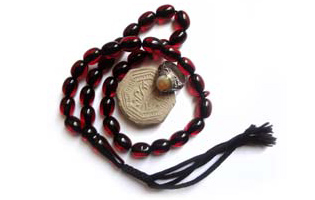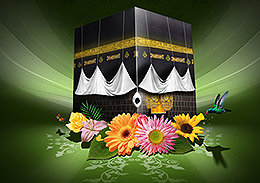A selection from sayings of Imam Khomeini
Never be disappointed from Mercy of God the Almighty
We are now on the threshold of the Month of Allah and the station of the banquet of Allah. I confess that I am not worthy of this banquet. The noble month of Sha'ban, which is the month of the Imams is about to end. We were not able to prepare ourselves for the Month of Allah. Sometimes, I have recited the supplications with and yet they have no effect; in this last part of the month, I am saying, “O Lord! If You did not forgive us during the passed days of Sha`ban, forgive us in its remaining days.” I am not hopeless of the mercy of God, the Exalted, and let it not be so! Let not the day pass in the world when the sins are such that we are hopeless of the mercy of God. My daughter and my dear! In these days it will pass, whether in winning and dinning or in agony and pain, or in negligence of the primordial nature or attention to it.
[Sahifeh-ye Imam, vol. 20, p. 235]
Purification of Inner and Soul
In the holy month of Ramadan, with all the blessings it has, we cannot duly extend gratitude for a single one of these blessings. However, in the holy month of Ramadan if any spiritual stage is attained, one should strive to keep it till the next Ramadan. If that stage is not attained, we should feel regret and strive to attain it. All these tumults are temporary. What will remain is that which is in us. It shall stay and it is with us. We should endeavor to reform our inner self.
[Sahifeh-ye Imam, vol. 20, p. 49]
Getting Ready for the Divine Feast
You must purify yourselves during this Ramadan and every Ramadan. Today, which is probably the last day of Sha`ban, you and I must prepare ourselves for attending “God's Feast”; His banquet, so that, God willing, we enter this great month with spiritual well-being and benefit by the Blessed and Exalted Lord's Light of guidance and so change ourselves for the better. We must really be different in this month as compared to the other months, and must try to comprehend the “Laylat ul-Qadr” (Night of Majesty) and its bounties.
[Sahifeh-ye Imam, vol. 13, p. 32]
The Significance of Prayers and Supplications
The supplications of some of the months and days, especially those that pertain to the month of Rajab, Sha'ban and Ramadan, strengthen the soul miraculously. Of course, I don't say I can understand such realities, but those who are familiar are aware of the effects of the supplications. These supplications open the way for the people. They are the search lights that enable the human being to come out of darkness and into Light] i. e. spiritual vivification. You must pay attention to these supplications.
[Sahifeh-ye Imam, vol. 13, p. 29]
Refining Behavior and Purification of Soul
Above all is that one should rectify oneself in the month of Ramadan. We need to purify and refine the self to the last day of our life. Prophets were also in need of this. Grand prophets were also the same, but they had realized their needs and subsequently acted to fulfill their needs. However, since we are veiled, we could not understand our duty and did not fulfill our duties. I hope that this holy month of Ramadan would be a blessing for you. Blessing means that you should plan to act according to the duties God has set for us.
[Sahifeh-ye Imam, vol. 18, p. 396]
Abandoning Lower Self-Desires in the Divine Guesthouse
This banquet is all about abandonment; abandonment of desires such as for foods, drinks, and other things that human desire requires. God has invited us; that you enter the banquet hall. This banquet is nothing except abandonment; abandonment of carnal desires, abandonment of egotisms, abandonment of selves; abandonment of egoism. All these are in the banquet hall and we have to evaluate and see whether we entered the banquet hall, or we did not enter at all; whether they offered us access to the banquet hall, or not; whether we take benefit from the divine banquet, or not. Of course, the account of the persons like of me, is with kiram al-katibin. But I would like to acquire you, gentlemen, and anyone who would receive these words, particularly the young people: Have you entered to this banquet hall? Did you make use of it? Did you not pay attention to the desires, especially the emotional desires? Or, you just remind like me?
[Sahifeh-ye Imam, vol. 21, pp. 45-6]









